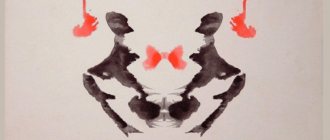Either a lot has been written about the Myers-Briggs personality typology and it is incomprehensible, or little and even more incomprehensible. And, despite the fact that the test for its determination is often criticized, it remains an important key to understanding personality characteristics. Generally speaking, it is used to determine how people perceive the world and make decisions. Many Western companies require passing the Myers-Briggs test for employment. Also, according to the authors of Wikipedia, about 70% of American graduates are tested in order to find out their strengths and choose their future profession. And in general, it provides an opportunity for self-analysis, which is why we have prepared this article and online test for you.
Why you need to know your personality type
Each person has a unique set of traits. You will not meet two absolutely identical people. However, there are some regularities in the formation of individual characteristics.
People who have similar innate characteristics (type of nervous system, characteristics of mental processes, natural inclinations) and develop in similar socio-cultural conditions are very similar to each other.
In this regard, people several thousand years ago became concerned with creating a universal classification of people.
Socionics: benefits for individuals and society
The socionics model today is penetrating into an increasing number of areas. Those who accepted it more than others include:
- Recruitment, training and development of personnel
- Improving the efficiency of organizational management
- Creation of innovative educational technologies
- Diagnosis and treatment of psychosomatic diseases
- Vocational guidance for teenagers and adults
- Raising children in families and specialized institutions
- Organization of dating
- Self-knowledge and self-development
The most popular area of application of socionics is building comfortable relationships in any social group. With the help of socionics, we can understand that complications in communicating with another person (an acquaintance, colleague, relative, etc.) may not at all be a consequence of his malicious intent or internal “unsuitability” for us. It’s just that different people perceive the world and life individually, have their own opinions, and have different values. And just understanding how our and other people’s psyches work can lead to getting rid of many problems in relationships and relieving tension. And this is important in absolutely any area of life.
In addition to this, studying socionics allows you to grow personally, expand boundaries, get out of your comfort zone, learn to be yourself and understand yourself without squeezing your personality into the framework of how it “should” be. Despite the unreliability of methods, biased results, and the lack of scientific status, this direction has an undeniable advantage. It consists in the fact that socionics helps everyone to form correct self-esteem, communicate more effectively with people, achieve their goals faster and easier and find their place in this huge world.
At the same time, from its very inception to this day, socionics has been subject to serious criticism. Let's consider it to get more objective conclusions.
How to find out your personality type
There are several ways you can determine your personality type. Not all of them are equally effective. Let's take a quick look at each of them.
- Special diagnostic techniques
This is the most reliable and reliable method. Psychological tests are developed by professionals and tested for accuracy and validity. Therefore, their results can be trusted 80%. “Why not 100?” - you ask. Much depends on how honestly and responsibly you answer questions and complete tasks.
Below you will find 10 methods for determining your personality type, with which you can type yourself. They are based on different criteria, so the more tests you pass, the more detailed your psychological portrait will be.
- Specialist consultation
An experienced psychologist types people with high reliability, based on his extensive professional experience. But it necessarily relies on diagnostic techniques too. Such typing can be more accurate, since the specialist knows how to bypass the client’s psychological defenses.
- Introspection
This is the simplest, but at the same time the most unreliable method. It is difficult for a person to objectively assess his characteristics, because psychological defenses seriously distort perception. Therefore, this method must be supplemented with others.
To try to type yourself, you must first carefully study the available psychological classifications, read the descriptions of the types, try on their characteristics for yourself, and try to find similarities and differences.
Find your unique letter combination
ESTJ - leader
Hard work and determination are your best qualities. You adore order, know how and love to plan, and take on the most difficult tasks without fear, because you are confident of success. You have a rational view of things; you trust facts much more than feelings. You are cheerful, good-natured and love company. Thanks to your organizational talents, you can easily incite others into any adventure.
ENTJ - commander
You are always on the crest of the wave: you know everything about the latest trends and tendencies. You have a lot of courage, you like to take risks and are always open to new things. You are dynamic, productive and love to overcome challenges. Your whole life is a struggle in the name of achieving your cherished goal. You have excellent leadership qualities: charisma, authority and the ability to think strategically attract people to you.
ENFJ - mentor
You are very insightful: you trust your intuition, and it never lets you down. You are observant, have a genuine interest in people and their emotions, and are able to detect the slightest changes in mood. People around you often turn to you for advice and support, and you are always happy to help them, and sometimes inspire them.
ESFJ is an enthusiast
You get along well with people and are always ready to help, sometimes even to the detriment of your own interests. You are responsive and open. Love and appreciate praise; you need the approval of others like air. If a conflict arises somewhere, you feel out of place and try to restore peace and harmony at any cost. You are like a ray of light in a dark kingdom - you are able to charge people with positivity and lead them.
ENTP - inventor
People like you are often called thought leaders. You are curious, mobile, love to be on the move and easily adapt to change. You are a true generator of ideas, constantly inventing and questioning things. You hate routine and try your best to avoid it. You are captivated by the new and unknown, so you often change hobbies. You think that in life you need to try, if not everything, then a lot.
ESTP - fidgety
The phrase perfectly describes you: “I see the goal - I see no obstacles.” You strive for victory at any cost, sweeping away all obstacles in your path. You are determined and daring, live in the moment and love to be the center of attention. The thirst for life is boiling inside you, you strive to learn everything in practice and not waste a single valuable minute.
ENFP is a champion
You are a creative person with an indefatigable imagination and excellent imagination. You are open to the world, freedom-loving, stress-resistant and not afraid of change. It is important for you to constantly take the initiative, offer original solutions, actively interact with people and empathize with them. Routine tasks are pure torture and punishment for you.
ESFP - politician
You live for today and get great pleasure from momentary pleasures. Planning and strategizing tire you out. When doing something, you often rely on luck, and if you fail, you quit the job without finishing it. You are spontaneous and unpredictable, you hate delays and strive to get everything at once. You love to impress others and make useful contacts.
ISTJ - administrator
“Measure twice, cut once” - this is about you. You love rigor and order, carefully think through and analyze your actions. You are results-oriented, so you only take on tasks that you know you can complete. You are careful and patient, and do not like empty chatter. You value honesty and hard work, and attempts to shirk responsibility cause you the same resentment as poorly done work.
INTJ - strategist
You are independent, erudite and know how to set priorities correctly. You do not like noisy companies, and you draw inspiration and breakthrough ideas from within yourself. You are a perfectionist to the core, and your cherished dream is to make the world around you more perfect. You hate retrograde rules and stupid restrictions and try to fight them with the help of your innovative ideas, in which you often succeed.
INFJ is a humanitarian
Helping others is an integral part of life for you. You believe that love and compassion can save the world. If one of your loved ones needs help, then he will definitely turn to you, and in return he will always receive clear guidance for action. You are vulnerable, value loyalty and do not forgive betrayal.
ISFJ is a protector
You can smell falsehood a mile away, so you keep strangers at a distance and stand behind your loved ones. You do everything to make the people you care about happy, and every day you try to pleasantly surprise them. You are diligent and often make incredible efforts to achieve your goals. True, you can be leisurely and like to procrastinate. Despite this, you can be relied upon because you never give up on what you started.
INTP - Architect
You have a philosophical mind. You constantly put forward hypotheses, argue with yourself, notice important details and strive to get to the bottom of things. From the outside it looks like you are distracted and have your head in the clouds. This is partly true: everyday issues do not bother you at all. You are focused on important thoughts and do not feel much interest in others. You value coziness and comfort, but have an extremely negative attitude towards change.
ISTP is a virtuoso
You experience the world through sensations, are able to deeply empathize with people and value sincerity. You are quite open, but in case of lies or hypocrisy, you withdraw into yourself. You think through every step carefully before you do anything. You are punctual, objective and moderately curious.
INFP - lyricist
The meaning of life for you is harmony with yourself and the world around you. You are an impressionable person and react sharply to any injustice. Self-expression is important to you: you not only do great work on your inner world, but also do not forget about your appearance. You can be dreamy and self-absorbed, but you always find an opportunity to pay attention to your loved ones.
Determining personality type using psychological tests
Psychological tests are widely used by teachers, HR specialists, sports coaches, doctors, criminologists and, in fact, psychologists themselves. With their help, experts create a detailed portrait of a person’s personality, on the basis of which they can correctly predict his behavior and build the most effective model of interaction with him.
It would also be nice for the person himself to get to know himself better. This will greatly simplify your life and make it more conscious. Knowing your characteristics, you can pick up the keys to the hidden reserves of the psyche.
Each test is accompanied by various recommendations: what profession to choose, how to smooth out your shortcomings and emphasize your strengths, what communication style to choose, etc. You just need to answer the questions carefully and honestly.
With these tests you can test not only yourself, but also other people. Testing of a child must be carried out under adult supervision.
More than 100 cool lessons, tests and exercises for brain development
Start developing
Professional techniques
Let's start with techniques developed by professional psychologists. These tests will show the most correct and accurate results.
- Eysenck test for determining temperament
It is best to start self-knowledge with this technique. Classifying people by temperament type is the basis on which all other typologies are based.
The test will help determine who you are: phlegmatic, choleric, sanguine or melancholic. The types are identified based on the characteristics of the human nervous system. They are innate and unchanged throughout life.
- Extroversion/introversion test
Swiss psychologist Carl Gustav Jung was the first to divide people into extroverts and introverts. This classification is based on the direction of a person’s energy: for extroverts it is directed to the outside world, and for introverts it is directed inward. Therefore, extroverts are sociable, cheerful, and energetic, while introverts are calm and reserved.
A little later, this classification was supplemented by another type - ambiverts. Representatives of this type combine the traits of both introverts and extroverts. According to the latest data, the world's population is distributed as follows: extroverts - 40%, ambiverts - 40%, introverts - 20%.
- Test to determine character type according to Kretschmer
The German scientist Ernst Kretschmer connected a person’s character traits with his physique. He noticed that people with similar morphological structures have similar psychological traits. Based on observations and experiments, he divided people into three types: picnics, asthenics and athletics. The test will help you determine which one you belong to.
- Leonhard-Smishek questionnaire on character accentuation
Accentuation is a character trait in which individual traits are overly pronounced. For example, anxiety can be either a normal character trait or an accentuated one. In the second case, a person experiences anxiety, even if there is no objective reason for this.
The German psychologist Karl Leonhard studied accentuations. He identified 10 personality types in accordance with a person’s prevailing accentuation. And Hans Schmischek developed a questionnaire based on this classification.
- John Holland Professional Personality Test
American psychologist John Holland has developed a technique that allows you to determine a person’s professional orientation.
The personal qualities required for each specific type of activity are combined into 6 large groups. Based on their predominance in humans, 6 personality types have been identified: realistic, investigative, social, conventional, enterprising, artistic.
Determine which one you belong to to understand which type of activity you can achieve the best results in.
Socionics: methods for determining sociotype
Traditionally, to determine a person’s sociotype (typing), the following are used:
- Socionic tests and questionnaires . The Myers-Briggs questionnaire is very popular, although experienced specialists (socionists) point out that the Myers-Briggs typology does not fully correspond to the socionic typology, so these questionnaires are adapted. There are also Weisband and Meged-Ovcharov tests, Talanov questionnaires, Gulenko test, Lytov multifactor test, Keirsey socionic test.
- Socionic interviews . This is a conversation between a socionicist and a person being typed on an arbitrary or planned topic (often accompanied by testing or questioning). When conducting a diagnosis, the specialist evaluates how clearly the signs of IMT and some other specific parameters are expressed. After this, the socionician compares the received data and makes a conclusion about TIM.
- Experiments . To implement this method, as a rule, socionics create special conditions for those being typed and set specific tasks for them. In the process of completing tasks, specialists monitor people’s actions, reactions, decisions, and then draw conclusions about TIM.
- Observations . A specialist observes a person (or a group of people), evaluates his appearance, behavior, actions, and non-verbal manifestations. But in order to draw reliable conclusions, a socionicist must have the skill of figurative-sensual recognition of TIM based on impressions.
- Research dossier . Socionics studies a person’s personal file, eyewitness accounts, personal texts and/or diary entries, photo and video materials, and creative results.
It is believed that experienced people and professional specialists can determine a person’s sociotype by his reactions, appearance, manner of communication and even style of clothing, without resorting to lengthy research. In addition, some are able to adequately determine their own sociotype. But in order to achieve such a level in socionics, it is necessary, firstly, to understand in detail the system of this direction and its sociotypes, secondly, to study the psychotypes proposed by Jung’s theory, and thirdly (if it comes to self-typing), to learn objectively perceive and evaluate yourself, your character traits, reactions and other features of your personality. We should not forget about the main problem of socionics - that from a scientific position it lacks objective criteria for determining the socionic type. In other words, any analysis of a person using socionics will not have reliable scientific justification.
However, if you learn to identify sociotypes, you will be able, with a certain degree of probability, to establish what the behavioral differences between people are and look for the right approach to them, determine the habits, interests and abilities of those around you, and understand what dictates their actions and actions. Possessing socionic knowledge, a person is also able to determine his compatibility with people, predict the development of relationships, highlight which qualities in other people should be perceived as basic, and which it makes sense not to pay special attention to. In short, socionics, despite the lack of scientific status, can be very useful, both for one person and for society as a whole.
Every person has shortcomings
Every person has some kind of physical disability. Even at the dawn of psychology as a science, scientists noted that all representatives of humanity can be divided into certain types, which have a set of qualities, both physical and psychological. And each type has a predisposition to certain shortcomings.
Imagining a kind, calm lout, you understand that we are talking about a person of a phlegmatic type of temperament. This is exactly what they most often look like - overweight, slightly clumsy, but consistent and benevolent phlegmatic people.
If a person is inclined towards thinness, is overly active, is often dissatisfied and nervous, then most likely he belongs to the choleric type of temperament. Please note that this is just a rule, which naturally has exceptions.
Secrets of interaction with each psychotype
Let's look at the specifics of interaction with each of the psychotypes according to Leonhard's classification:
- Hyperthym. Help hypertim direct energy in a useful direction, give direct instructions, entice him into something like a child. Do not criticize him or set strict boundaries, respect the hypertim’s freedom and his interests. That is, in choosing a hobby you need to find what attracts him.
- Distim. Avoid criticism, harsh language, and arguments. Respect the rigidity of the dystimus, do not leave it alone with something new. Give compliments and support his self-confidence. Let's take some time to rest. Remember that distim gets tired quickly. Help him develop his abilities and overcome suspiciousness and uncertainty.
- Cycloid. It is interesting to live and communicate with such people. They are unpredictable and creative. However, this also becomes a cause of conflicts in business or personal relationships. Dealing with this type is like riding a roller coaster. What to do? Determine the cycle specifically for your friend. Learn to independently identify phases and adapt to them. For example, if you have long wanted to ask a cycloid for something, then wait until he is in a good mood. If you understand that now he has a loss of strength, then it is better not to overload him with anything and not to irritate him. It is important to accept the fact that the cycloid's brain cannot work any other way. Therefore, there is no point in being offended, making trouble, or trying to change a person.
- Excitable. Always strictly guard your personal boundaries and maintain social distance. Do not make concessions, prove your importance and authority. Do this with restraint so as not to provoke the person into rash actions.
- Stuck. Try to protect a person with a stuck psychotype from uncertainty. Be as consistent, open and clear as possible. Give instructions, say everything directly. However, don't let the stuck type violate your personal boundaries. Make it clear that you will not be pushed around. If you lack support, understanding and warmth from a stuck type, then find it elsewhere, for example, turn to friends.
- Pedant. One of the most difficult types. There are two options: either you accept his meticulousness, or leave this relationship. A pedant needs correctness, stability, and conscientiousness. The main thing is that the other participant in the relationship does not end up in a neurosis clinic in pursuit of this.
- Anxious. Encourage and praise him, show signs of attention, express your trust. Don't criticize unnecessarily. And if you have to do this, then first praise, and then wrap the criticism in the wrapper of a wish (“You’re doing everything well, if only… then you wouldn’t have any value at all”). Give more clear instructions, do not leave him alone in unfamiliar, frightening situations.
- Emotive. Never lie to an emotion. This is the only thing he does not accept. In all other cases, he himself will find an excuse, an explanation, a special approach for you. Don't play with emotive feelings, don't try to hide something. For example, if you are not interested in a person, then say so directly. He will not be offended or angry, but will step aside in a friendly and tactful manner. But a lie can offend him.
- Hysteroid. Help the hysteroid feel like the first, the best. This does not mean that you need to worship and obey him - be subtle. However, one should not admire too much and feed the illusion of superiority. That is, you can emphasize the real merits and achievements of the hysteroid. Get ready for your successes to anger and irritate him. Don't give in to provocations.
- Exalted. Avoid surprises, do not arrange surprises for the exalted type. Create the most stable soil in your relationship. Monitor your emotional reactions. Be discreet. Do not take his mood swings and affective outbursts personally. Do not enter into conflicts with an exalted type.
- Extrovert. Respect his need for social contact. Do not encroach on personal space or limit the freedom of an extrovert. For example, if your girlfriend is an extrovert, then you cannot ask her to communicate less with her friends and girlfriends, or to stay at home more often. In the end, you yourself will get tired of its activity. True, if you are both extroverts, you can find a source of strength in each other.
- Introvert. Respect personal space and the need for privacy. Do not get into the soul of an introvert; give him time for personal hobbies. Don't torment him with formal conversations.
Knowing these basics, you will be able to draw up a more complete, detailed and accurate plan for interaction specifically in your case. And to make this even easier, I recommend that you determine your psychotype and identify your strengths and weaknesses.
What is profiling
The method of studying a person and the characteristics of his behavior, actively used since the 80s of the twentieth century, finds its application in practical business and in family life. The ability to quickly determine what kind of personality type a colleague or partner will have will help you understand how he will behave in a given situation. Profiling is based on drawing up a portrait of a person based on his behavioral patterns, verbal and non-verbal manifestations. The technique of asking clear questions will tell you what a person is capable of, whether he can commit a crime or succeed in his work. Knowledge of the basic characteristics of an individual's personality will be useful in influencing and managing him.










